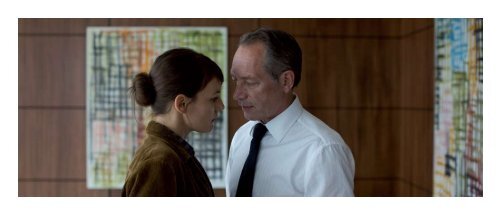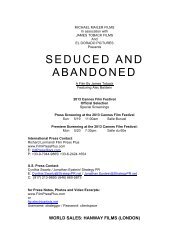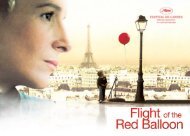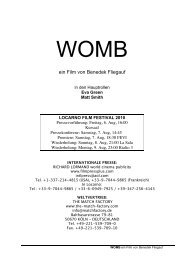Create successful ePaper yourself
Turn your PDF publications into a flip-book with our unique Google optimized e-Paper software.
comments from christoph hochhäusler<br />
unexplainable attraction When Roland’s wife eventually confronts him about his<br />
affair, he says: “I have no name for it.” We all consider ourselves rational animals,<br />
but we are not, actually. Not <strong>the</strong> slightest bit. Love might be a deal, but attraction is<br />
primal. You meet someone, anyone, and instantly you know you could love or hate him<br />
or her. The first thing we know is feeling. That’s dangerous, but despite what we believe,<br />
all <strong>the</strong> logic in <strong>the</strong> world can’t protect us from animal instinct. For me, cinema is all about<br />
this kind of danger.<br />
longing for <strong>the</strong> opposite Svenja and Roland are not on <strong>the</strong> same social level,<br />
and <strong>the</strong>y never will be. He’s part of corporate aristocracy, and he married into old<br />
money for a reason. His whole life is dedicated to <strong>the</strong> game and its rules. He loves<br />
deals and deals love him. Svenja’s game is life. She could not care less for <strong>the</strong> game<br />
of big finance. There is this famous phrase by artist Maurizio Nannucci: “You can<br />
imagine <strong>the</strong> opposite.” For me, it means that <strong>the</strong> opposite follows us, like a shadow, like<br />
a nihilistic desire to break up with <strong>the</strong> comfort we have surrounded us with. We want to<br />
get real, to wake up. It’s a confrontational thing. We have <strong>the</strong> hope to be awakened by<br />
someone, an opposite force. One longs for <strong>the</strong> opposite. This is perhaps <strong>the</strong> heart of <strong>the</strong><br />
<strong>film</strong>. It’s really about losing touch with reality, and about <strong>the</strong> counter reaction, attaining<br />
reality in love, in <strong>the</strong> body.<br />
svenja I have always seen Svenja as someone coming from a floating, unsteady<br />
life. Someone for whom it is difficult to say no. Not out of weakness, she is just open,<br />
curious to see what will happen next. Unlike her husband Oliver, who is driven by an<br />
image, an idea of a life he wants to achieve. But what’s fascinating is how Svenja<br />
manages to confuse Roland’s – and our – imagination again and again. Svenja is no<br />
victim, no puppet on a string.<br />
roland Roland can shape <strong>the</strong> world to suit his will, at least for some time. He is well<br />
aware of his attraction to Svenja and he plays with it right from <strong>the</strong> start. But he will<br />
be taken by surprise that <strong>the</strong> affair actually matters to him. What comes as a surprise,<br />
or more precise: as an accident, is <strong>the</strong> momentum, <strong>the</strong> gravity of his feelings.<br />
a challenge and a mirror Svenja is Roland’s equal. The only reason she is interesting<br />
for him. As a challenge and as a mirror. They resemble each o<strong>the</strong>r in <strong>the</strong>ir deep<br />
sense of loss. They both have no firm ground beneath <strong>the</strong>ir feet. Something binds <strong>the</strong>m,<br />
but I don’t think <strong>the</strong>se two will grow old toge<strong>the</strong>r.










